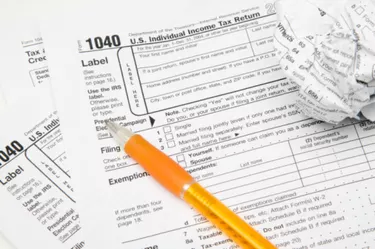
Every year, people pay taxes to the government. These taxes fund everything from road construction to national defense programs. Normally, you pay taxes little by little through the year through deductions in your paycheck.
However, in some instances, it's necessary to prepay your taxes, estimating what you'll owe and handing that amount to the government early. Understanding how to prepay taxes will help you avoid penalties and interest.
Video of the Day
Video of the Day
Consider Also: Who Must File Income Taxes?
Definition of Prepaid Taxes
Prepaid taxes are taxes you pay before you actually incur them. They are a paid estimate of what your taxes will be in the future. Because prepaid taxes estimate what you would have owed, they are better known by the public and IRS as estimated taxes.
Some individuals view prepaid taxes as a form of deferred tax asset. However, deferred tax assets can span more than one year while prepaid taxes usually cover just one year.
Consider Also: What Happens if You Don't File Taxes?
Avoiding Fines and Penalties
When you pay taxes, the goal always is to have no tax liability – that is, you want to pay enough in taxes through the year that you don't owe Uncle Sam when you file your return. Sometimes, because people make more than they expected or don't take enough deductions and credits, they don't pay enough and end up with a tax liability.
If you aren't sure how to prepay federal income tax, you can look at your income, deductions and credits for the previous years, as well as the amount you owed in the previous years, to determine how much you should be paying – your estimated tax – to have no liability.
You pay this tax ahead of time so that when you file your return, you won't owe the government any taxes. If you end up overestimating what you owe, the government will issue you a refund. If you underpay, you might be fined and owe interest on the underpaid amount.
Consider Also: How to Calculate Self Employed Income Tax
Who Should Estimate Taxes?
People who are self-employed typically benefit from paying estimated tax if they expect to owe more than $1,000, as they do not have an employer who can deduct taxes from earned wages. Partners, those who are sole proprietors or S-corporation shareholders also may need to prepay taxes. If you're filing as a corporation, prepay if you expect taxes to exceed $500.
Anyone who has a tax liability carrying over from the previous year also should prepay, as you already know you owe the government the liability amount. If you earn wages, you can avoid having to prepay by filling out paperwork with your employer to authorize him to deduct more in taxes.
When and How to Prepay
You may prepay your taxes in two ways. The method recommended by the IRS is to use the Electronic Federal Tax Payment System, which lets you make estimated tax payments online. You need to sign up for EFTPS service on the IRS website before you make your payments. The other way is to send vouchers for estimated tax along with your payment to your appropriate IRS office.
The vouchers are associated with Form 1040-ES. They are available for at-home printing through the IRS or generated by tax payment software programs. Typically, you should pay estimated taxes in quarterly installments through the year, although EFTPS allows you to pay more often if it is convenient.